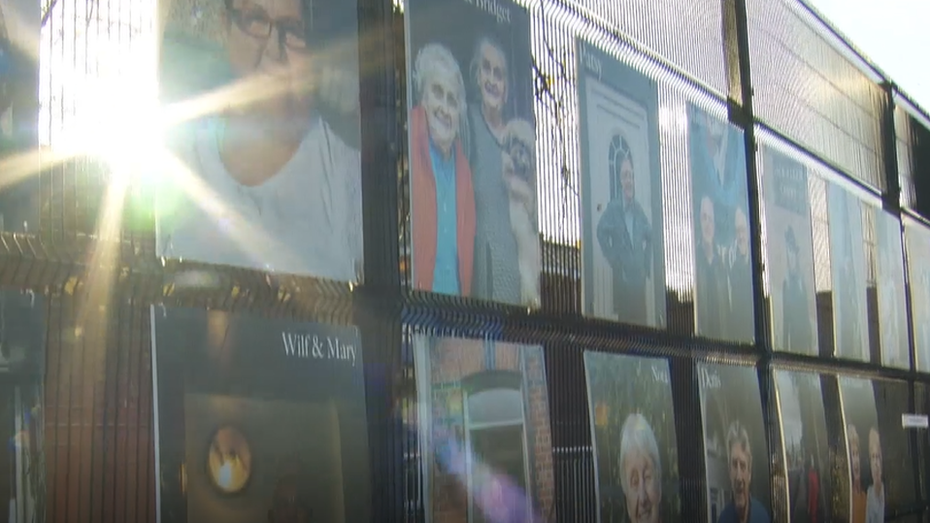Coronavirus: Care home window visits bringing 'tears and loneliness'
- Published
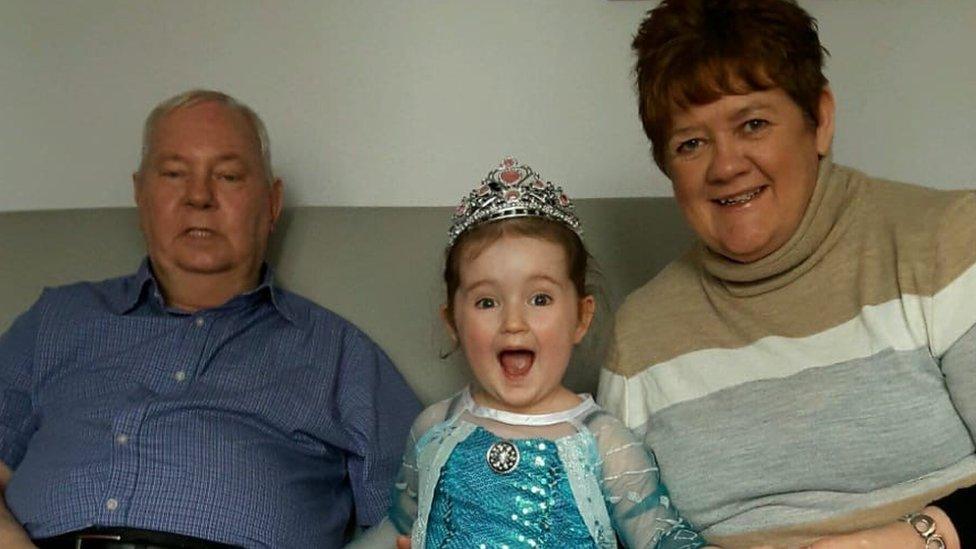
Care home resident John Duffy is a much loved father and grandad
When John Duffy's family came to visit him, looking through a window into his care home on Monday, he burst into tears.
It was his 71st birthday. When his daughter asked him why he was crying, he replied: "Because I haven't seen you in so long."
Coronavirus restrictions on care homes meant his family had not been able to visit him over the previous six weeks.
But because it was his birthday, an exception was made - and the Duffys were allowed a brief "window visit".
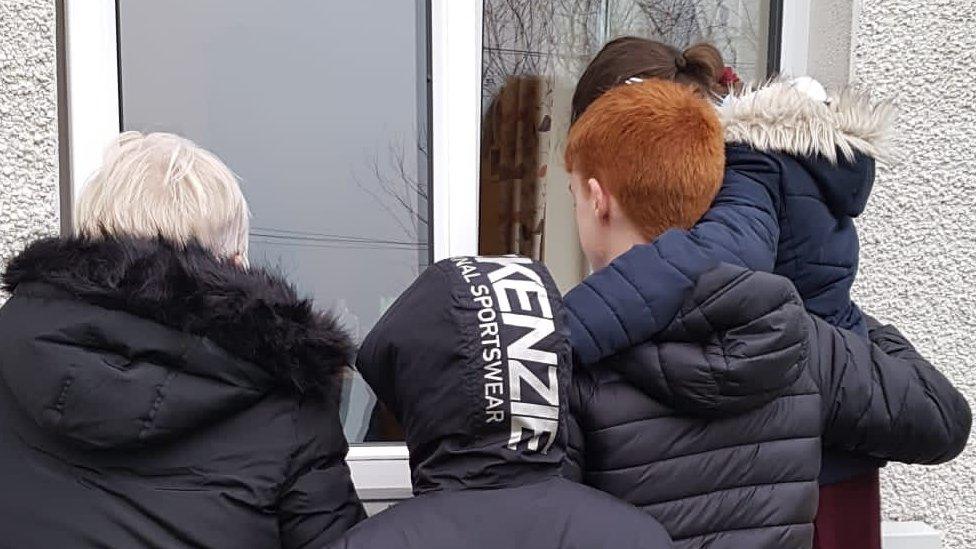
Like many families, the Duffys' only face-to-face contact is through a care home window
Donna Duffy appreciated the home's gesture for her father, who has dementia, and also understands care homes must obey rules to protect vulnerable residents from Covid-19.
But eight months into the pandemic, the Belfast woman said she believes current visiting arrangements are damaging the mental and emotional well-being of residents and their families.
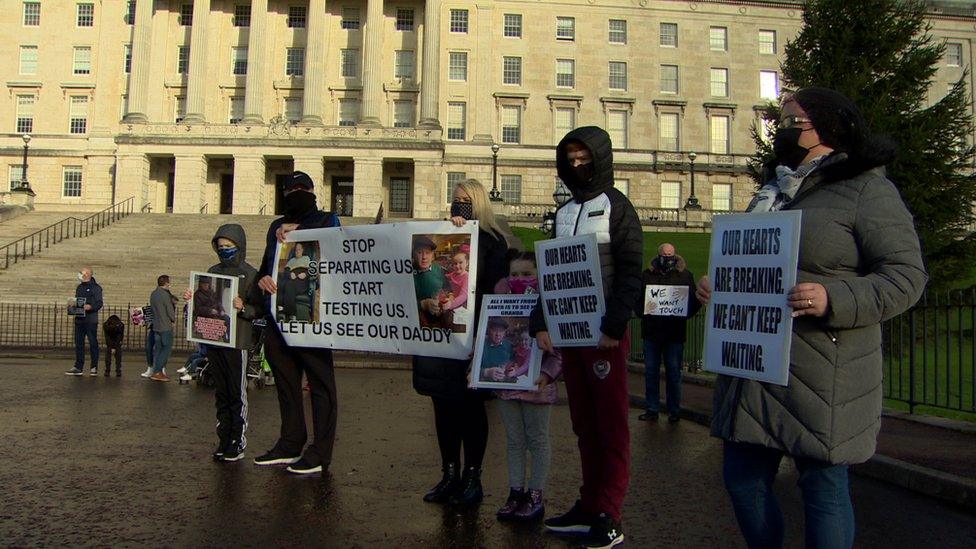
A protest was staged on the rules around visiting loved ones at care homes at Stormont on Saturday
Ms Duffy and other campaigners staged a protest at Stormont on Saturday to highlight the isolation and "loneliness" felt by residents and their loved ones.
"Every human needs emotional warmth," she told BBC News NI.
"I need to be able to hold my daddy's hand again and tell him that he's ok."

John Duffy has spent several weeks without family visitors
Care homes have been badly affected by Covid-19 and stringent visiting guidelines were introduced to protect residents from infection.
Out of a total of 483 care homes in Northern Ireland, nearly 30% (143) are currently dealing with confirmed Covid-19 outbreaks.
Reducing footfall in care homes is viewed by home managers as "one of the most effective measures" in minimising infection, according to the Department of Health's most recent guidance.
But the same document acknowledges restricted visiting has "contributed to an emotional trauma" caused by separating residents from family members.
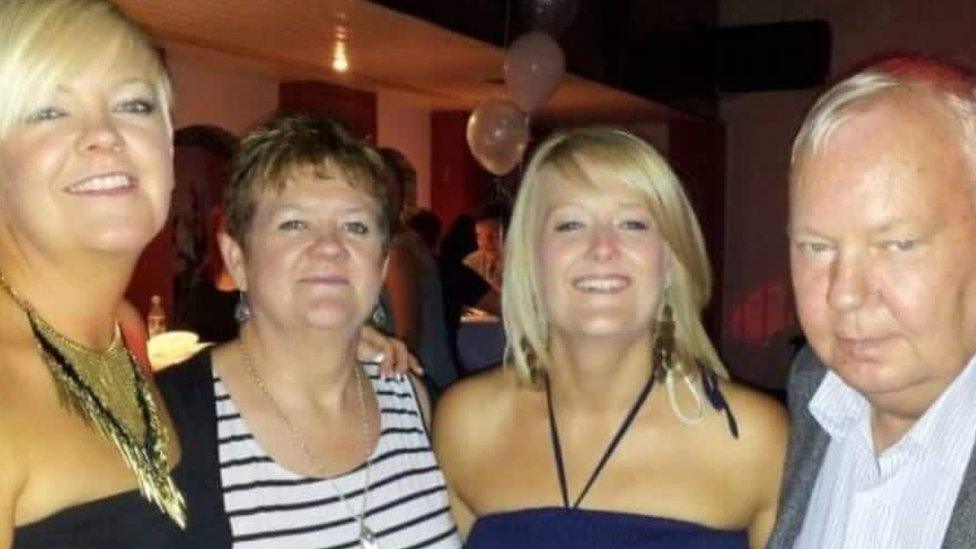
John Duffy with his wife and daughters
Ms Duffy believes residents need face-to-face visits from family. She said the risk could be "managed" through regular testing and use of personal protective equipment (PPE).
"No-one wants to put anyone at risk, we're not asking for whole families to be allowed in," she said.
Instead, she is calling for one person from each family to be awarded the "same status as key workers", and be given access to PPE and testing, so residents can maintain physical contact with loved ones.
'She's alive - but I feel like I'm grieving'
Other relatives who took in Saturday's protest included Martina Ferguson.
Before the pandemic began, she visited her 87-year-old mother every evening, "tucking her into bed" at her County Armagh care home.
Her mother, Ursula Derry, has advanced dementia. The pensioner can no longer speak or walk, but she can still "smile and giggle and laugh," according to her daughter.
"She recognises me - even when I'm wearing a mask."
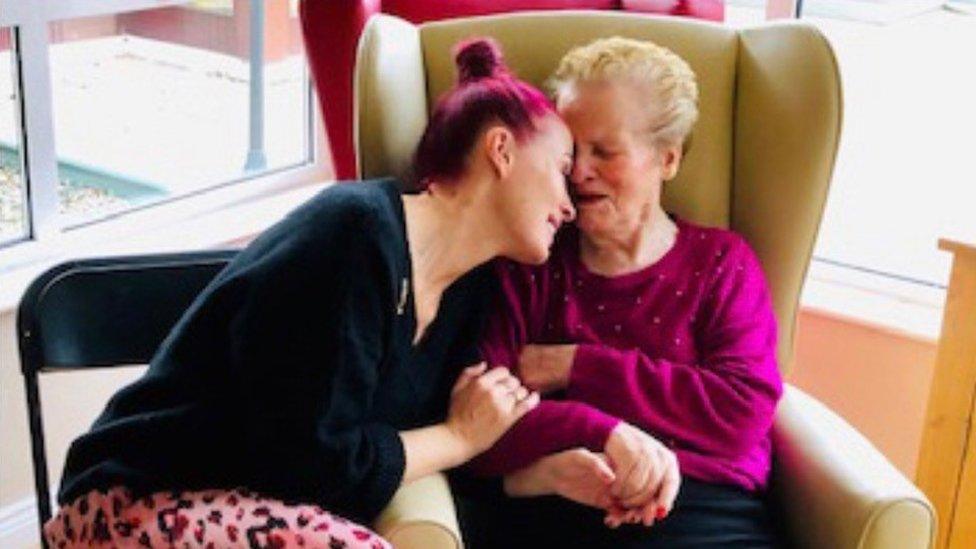
Martina Ferguson with her mum, Ursula Derry, in the month before lockdown
Their daily visits stopped abruptly at the start of lockdown in March and the lack of face-to-face contact over the past eight months has been difficult for both mother and daughter.
"I feel like I'm grieving the loss of someone who is still alive," Ms Ferguson said.
Like many families across the UK, their visits are now little more than a wave through a care home window.
"I go round to my mummy's bedroom window, I wave and try to talk to her through the glass.
"My mummy is lonely," she added, fighting back tears. "She must feel abandoned."
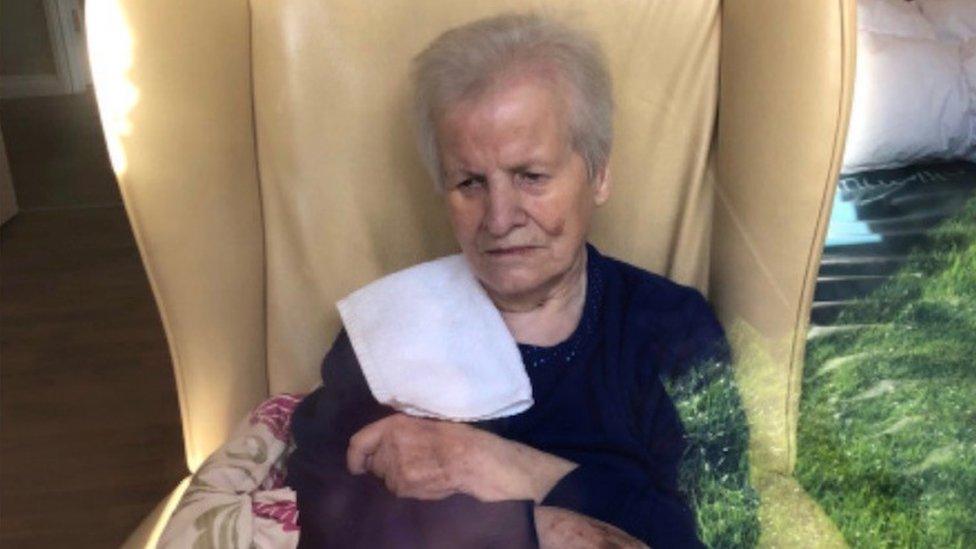
Ursula Derry, pictured through the window of her care home bedroom earlier this month
Ursula Derry is not used to being separated from family for long periods.
Born as a twin in the early 1930s, she raised six children and is now a great-grandmother.
But the pensioner has "become withdrawn" in recent months, according to her daughter, who fears she is suffering emotionally from the separation from her loved ones.
Ms Ferguson is calling on homes to "strike a balance" on family visits to protect residents' mental and emotional well-being.

Ursula Derry and her daughter, Martina Ferguson, at a wedding
She also believes risks could be managed with strict infection control measures, pointing to her experience when her mother was taken into hospital for 13 days in July.
Wearing PPE, Ms Ferguson was able to be at her mother's bedside on the ward, hold her hand and comfort her for the first time in months.
When Mrs Derry was discharged from hospital, she was readmitted to her care home and has had no physical contact with her daughter since the summer.
Christmas wish 'for Grandad'
Fearing the pandemic will continue well into next year, Ms Ferguson said homes must find ways to accommodate visits to prevent months of further separation.
Ms Duffy's father is also a big part of her family's life and is much missed by his grandchildren.
"My six-year-old niece is asking if Santa Claus will bring grandad home for Christmas," she said.
"She says Santa can take any of her toys off her list, as long as he brings her grandad."
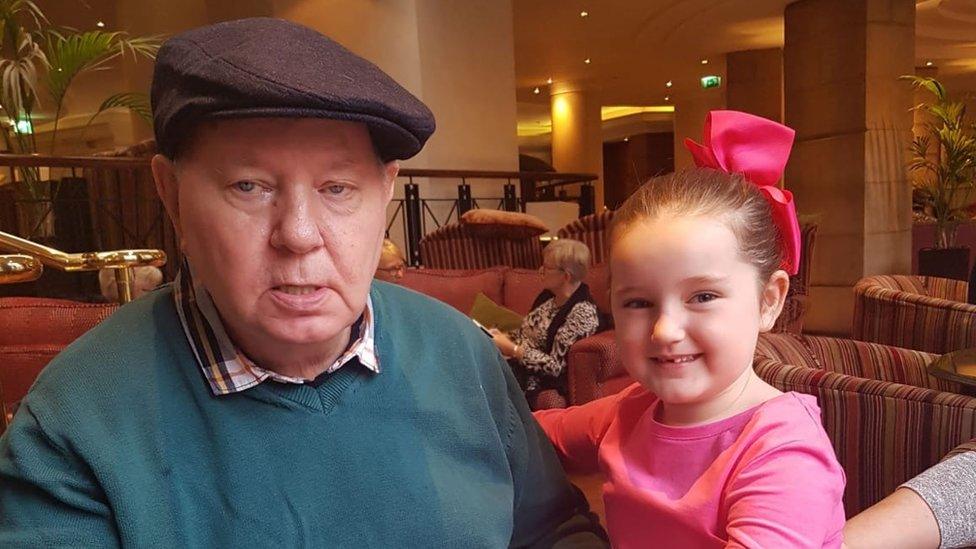
John Duffy with his granddaughter, celebrating his 70th birthday in November 2019
But there are no easy answers to the unprecedented challenges faced by health staff, trying to keep the most vulnerable people in our society healthy, happy and safe from infection.
Care home residents account for more than 40% of all Northern Ireland's Covid-related deaths.
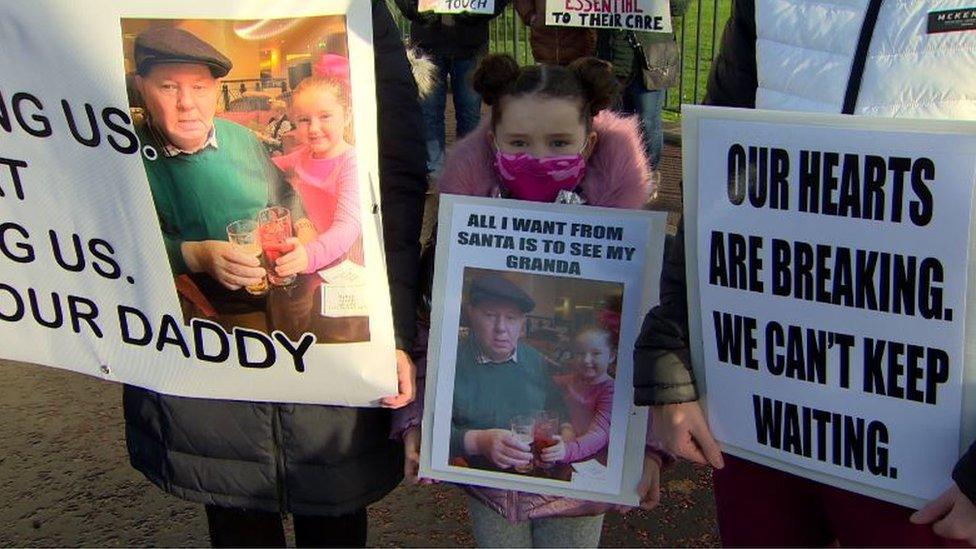
John Duffy's family was at the protest on Saturday
In a statement, the Department of Health said the department's minister, Robin Swann, "fully recognises how difficult and upsetting it is for people in care homes not to see their loved ones".
Acknowledging homes face "challenges" in safeguarding residents from Covid-19, the statement added "every effort should continue to be made to ensure residents maintain important social connections".
Care partner arrangements
The department issued guidance in September, external on a risk-assessed approach to visiting which included "safely managed face-to-face visits as well as virtually-supported connections".
That guidance also encouraged homes to develop a "care partner arrangement" with individuals who have a pre-existing relationship with residents.
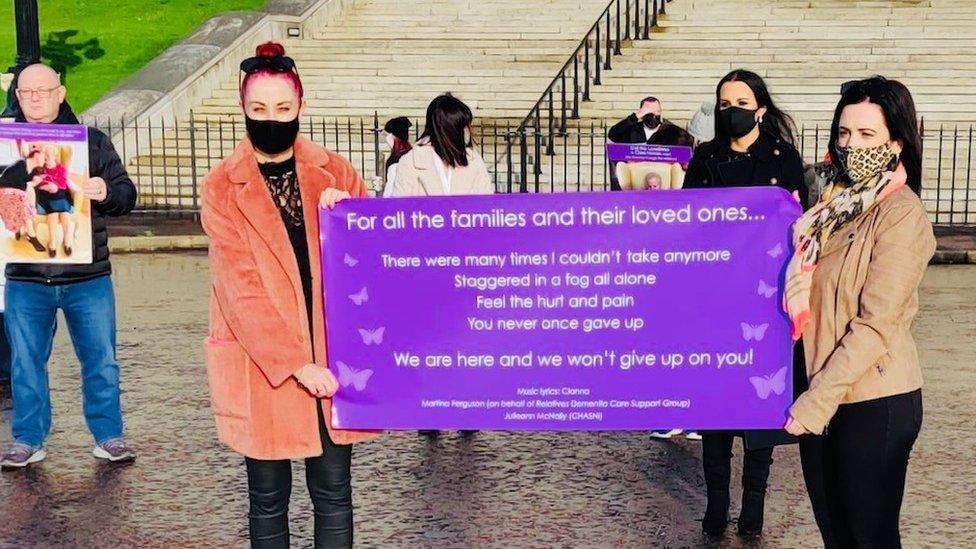
The protest took place at the steps of Stormont
This could be a family member or friend who carried out a caring or support role for a resident before visits were restricted.
The document said that care partners may quickly pick up on a resident's discomfort, illness or upset because they know the person so well. It also recognises the absence of that support can cause distress.
Ms Ferguson and Ms Duffy support the idea of care partners but complain that some homes are not implementing the guidance.
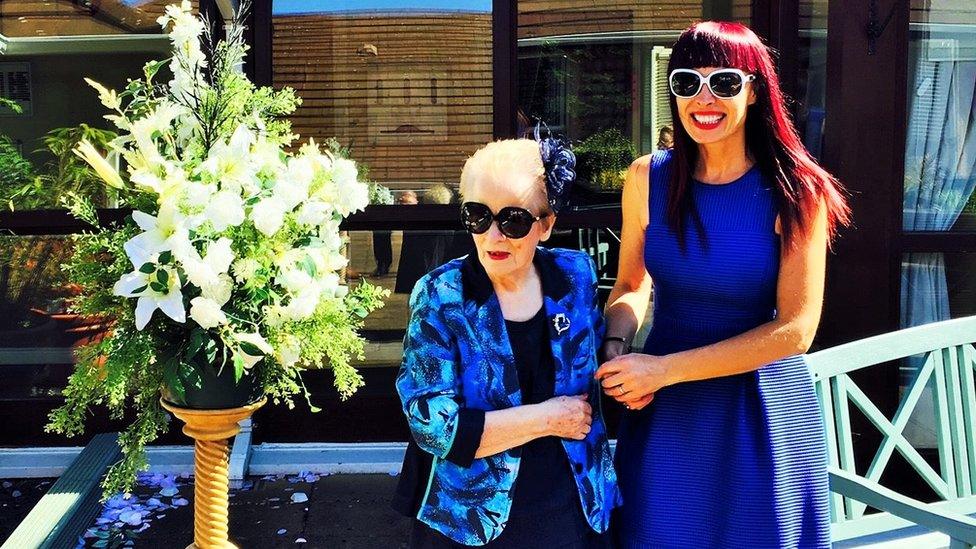
Martina Ferguson taking her mum to a tea party a few years ago
Ms Duffy called for the guidance to be replaced by legislation, suggesting that until it has legal force, care homes can "pick and choose" their own visiting rules.
She also said homes need more support from the department to introduce the changes.
Its latest guidance, external, the department states the care partner concept "will be applied differently for individual residents" and each care home will be responsible for agreeing how it is applied.
However, the department said it is in talks about providing "assurances" on how visiting guidance and the care partner concept are implemented.
- Published20 November 2020
